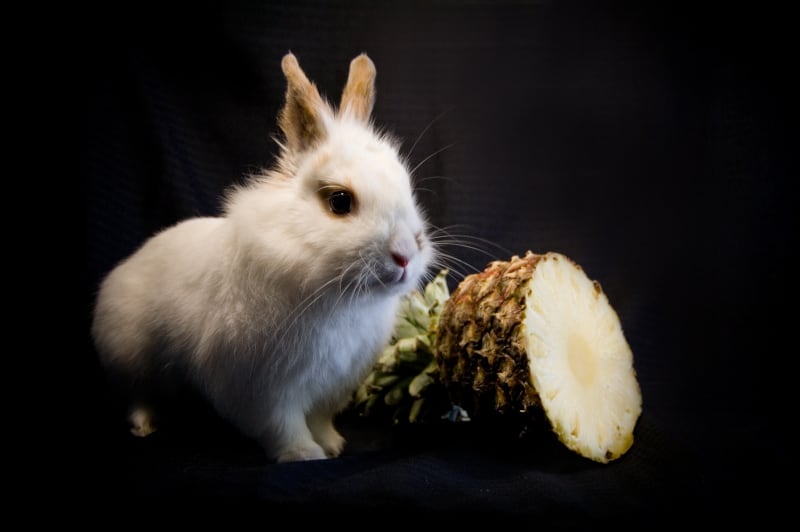When we decide to bring home a pet, we have to commit ourselves and take responsibility for taking care of it, loving it, and feeding it properly. One of the main concerns we may have is what food rabbits can eat and as a result if pet rabbits can eat pineapple. They depend on us to provide them with everything they need in terms of habitat, food, and health.
Choosing a rabbit as a pet has many advantages for its small size. Rabbits are wonderful pets for families, and they are the ideal pets for small places. These adorable creatures love to be pampered and like to approach the people who love and care for them. They are also easy to train and very clean. Unlike other pets such as dogs and cats, these animals have different needs that are important to be aware of before making a decision.
Taking care of these small details will be essential to give a better quality of life to your pet rabbit. Above all, one must learn about the basic requirements of the rabbit’s diet as they tend to have a very delicate digestive system. Their digestive system can be easily affected due to low fiber intake and the proliferation of harmful bacteria.
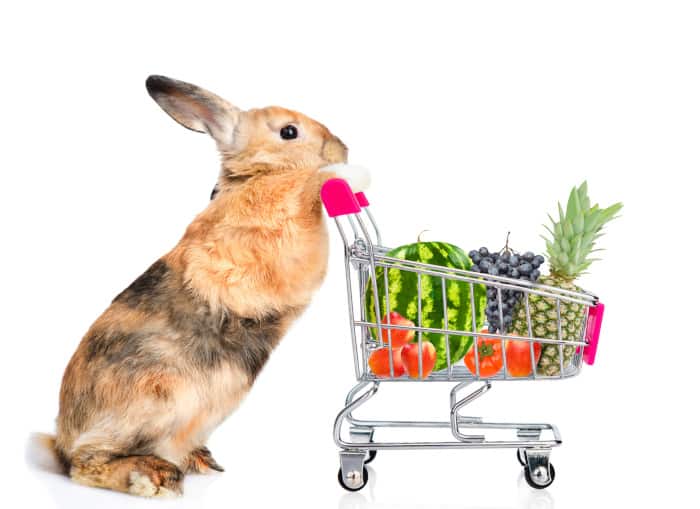
Two of the most common problems in rabbits are gastrointestinal tract problems and problems with their teeth. Both of these issues can be avoided to a great extent providing our rabbits with an adequate diet. On many occasions, some of these conditions turn out to be irreversible and fatal to rabbits in captivity. A decrease in gastrointestinal movements, also known as gastrointestinal stasis is a common, silent, and deadly disease. Lack of appetite is the most common symptom. Any adjustment in their diet can lead to a change in their digestive system, which can be deadly if the animal is not treated quickly.
Rabbit’s teeth never stop growing and need to be worn out continuously. Rabbits need to eat hay (fiber) to produce the abrasive effect on their dentures.
The digestive tract of rabbits is unique. They have a small stomach with thin walls and lack a well-developed muscle. The peculiarities of their digestive systems make rabbits need a special diet. Their diet should contain a lot of fiber, and should not have too many simple sugars or starch that can ferment quickly and complicate slow intestinal transit. Their digestive system works through pushing, i.e. the food they ingest pushes through the food that is already inside their digestive tract. For this reason, rabbits need to eat from time to time in order to maintain the food transit, so they eat small amounts at a time.
It is of the utmost importance to know what type of diet a rabbit should have. Your pet’s good health and quality of life will depend mostly on it. First of all, you must know that rabbits are strictly herbivorous animals. Therefore, their diet should be rich in fiber and low in sugars or carbohydrates.
Can Pet Rabbits Eat Pineapple?
Your pet rabbit may eat pineapple, but this fruit must be fed sporadically in limited quantities. As we have already mentioned, rabbits have an extremely delicate digestive system. For this reason, we must be careful when feeding them, especially with fruits.
Fruits contain many sugars, especially the more ripe and sweet. These sugars cause the proliferation of many bacteria that produce fermentation within the rabbit’s digestive system. Fermentation will result in cramping, abdominal distension, and bad digestion. In case you want to give fruits to your pet rabbit, these should be fed in small amounts or as treats that serve to train them and to reward the rabbit when it achieves something.
When Is It Recommended To Feed Your Pet Rabbit Pineapple?
Pineapple can be useful when it comes to helping get rid of hairballs. Rabbits shed hair twice a year, in spring and autumn. Having them inside the house causes them to change their life cycle. These rabbits can shed their hair 2 to 3 times a year, or even more.
Moreover, rabbits have good cleaning habits. Like cats, rabbits have the habit of grooming themselves frequently. Due to this habit, they manage to ingest a large amount of hair. Contrary to cats, rabbits are unable to vomit, so the hairballs accumulate in their digestive tract leading to occlusion and severe intestinal issues. The danger is even worse in long-haired rabbits.
What Benefits does the Pineapple Provide to the Rabbits?
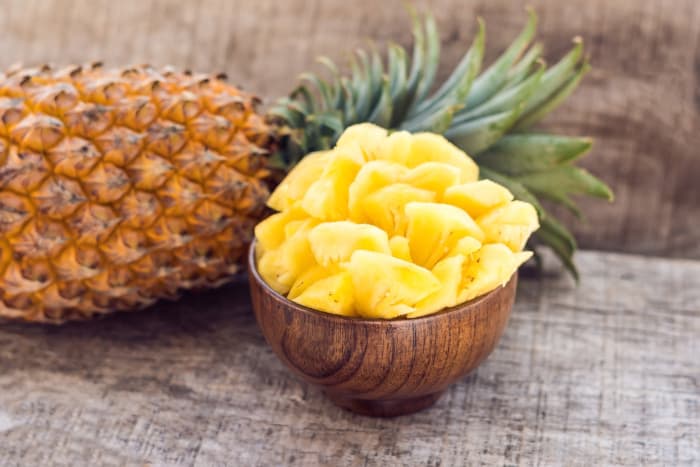
Pineapple breaks down the hair because it has an enzyme called bromelain. Bromelain is a proteolytic enzyme, which means that it can break down proteins. Hair is composed of the protein keratin. Therefore, bromelain will be able to dissolve the hair strands, making it easier to eliminate in the feces.
Some of the nutritional benefits that we can get from pineapples are:
- Vitamins: vitamin C, B1, B6, B9 (folic acid), and a little bit of vitamin E.
- Minerals: potassium, phosphorus, magnesium, iodine, copper, and manganese, among others.
- Acids: citric acid, malic acid, oxalic acid, and the enzyme bromelain
Also, pineapples are rich in antioxidants, have diuretic effects, anti-inflammatory effects, and laxative effects due to their high fiber content.
How do I Feed the Pineapple to My Pet Rabbit?
We recommend feeding the pineapple to adult rabbits in small pieces 2 to 3 times a week during the molting season, and once a week if the rabbit is not in the molting season. Some rabbits love to eat pineapples. However, others do not like its taste.
If you happen to have a rabbit that refuses to eat its pineapple, you can always crush it to extract its juice. You can then feed your bunny from 1 to 2 ml of the extracted juice through a small syringe.
What Other Precautions Should Be Taken to Avoid Hairballs?
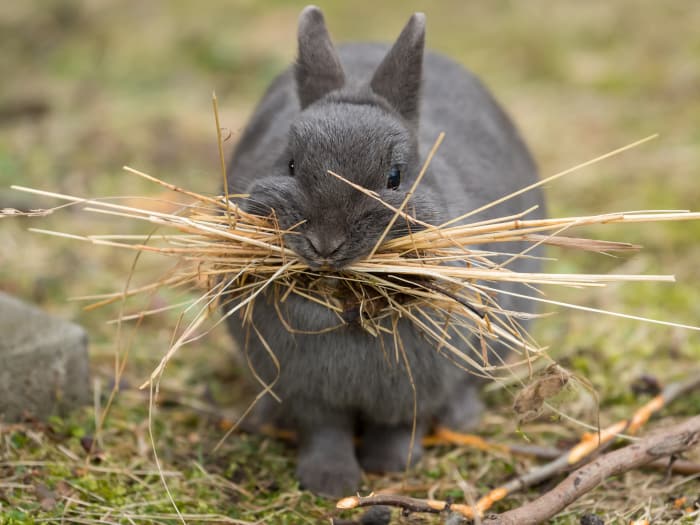
Hairballs can cause dangerous digestive problems such as bowel obstruction. The best way to avoid these complications is by taking certain precautions, including:
- Daily brushing will help remove excess hair before your rabbit has the chance to ingest it.
- Unlimited quantities of hay. Hay is high in fiber, which helps in the elimination of hair from the digestive tract. It prevents hairballs, diarrhea, obesity, and helps maintain your rabbit’s teeth in good condition.
- Vegetables that provide high fiber content
If They Cannot Eat Fruit as Often, Then What Kind of Food Does a Rabbit Need?
You can make sure that your rabbit is well fed by including the following foods in its daily routine:
- Hay is the basis of a rabbit’s diet. It should constitute 80% of its diet. Hay provides fiber to the food portion. Its composition must be varied and contain different plants. There are many brands available on the market. Their nutritional properties can vary depending on the type of plants, their drying process, and the cut. Hay should always be available to your rabbit in unlimited quantities. It should be fresh, green, and smell good enough, which will make it more appetizing and will help your rabbit to consume it in greater quantity. Dried and yellowed hay retains its amount of fiber but has lost many nutrients.
- Vegetables are a healthy addition to the dietary needs of your rabbit. These should make up 15% of your pet’s eating routine. Green leafy vegetables are an excellent source of vitamins, minerals, and other essential nutrients for healthy growth and development of your rabbit. We should try to make this as varied as possible. These can be artichoke leaves, lettuces, carrot leaves, radish leaves, spinach, etc. You should be giving them vegetable leaves once a day as a minimum and removing what has not been consumed in a few hours to prevent your pet from eating leaves that have fermented.
- Dry pellets make up 5% of the rabbit diet. They should be eating a high-quality feed that is pressed and free of cereals and seeds that are not necessary for the rabbit diet. The feed should have a high percentage of fiber, a level of fat as low as possible, and not have too much protein. The number of pellets to feed an adult rabbit will be 1 or 2 tablespoons a day. For younger animals, it is recommended to feed less quantity.
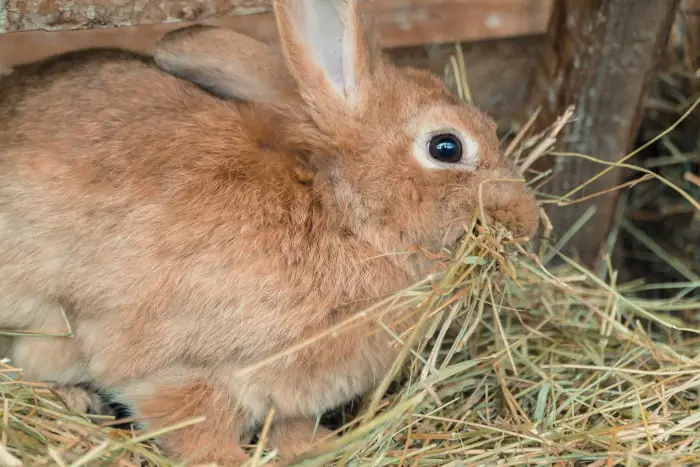
Now that you know how delicate the digestive system of rabbits is, it will be easier for you to determine the type of food your little friend needs. Although pineapple is beneficial to help remove hairballs, rabbits should only be fed small amounts due to its high sugar content.
Rabbits do not benefit from a high-sugar diet because harmful bacteria cause sugar to ferment. Fermentation produces severe intestinal problems in rabbits. Remember, rabbits are herbivorous animals, so you won’t need a diet rich in protein or carbohydrates.
Make sure your rabbit gets the type of food that will provide all the right nutrients such as fibers, vitamins, and minerals. They will get everything they need from hay, green leafy vegetables, and dry pellets.
Finally, make sure you offer them plenty of clean, fresh water to keep them hydrated at all times. By following these simple recommendations you will ensure that your little companion enjoys a full and healthy life.

